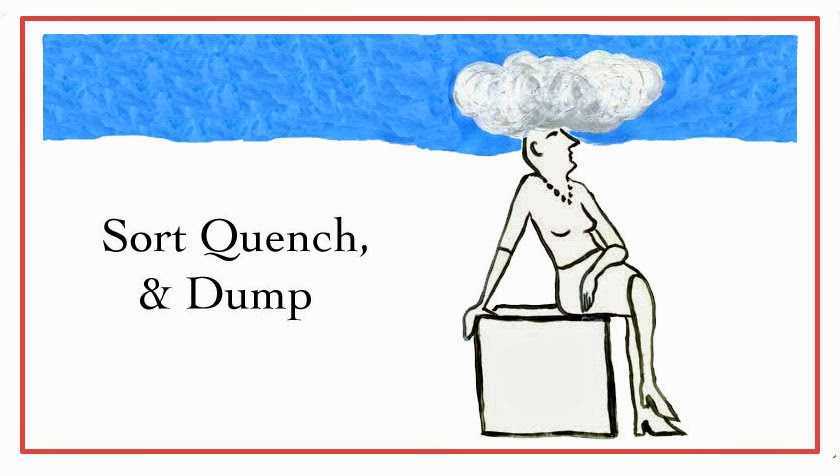How are they to know you are playing Solitaire on your laptop, or memorizing poems by William Blake, or reading old Pogo comic strips on line, or researching the pros and cons of having your cuticles clipped at the nail salon? Sure, the choreography of your fingers over the keyboard may give the impression that you are writing a book. But in fact you are composing an irate letter to the village trustees about the waste of taxpayer dollars that will be the Stroller-derby; or to the president of Delta airlines about the problem of insufficient air circulation on airplanes, and how you start having religious visions if you are deprived of oxygen. No one knows. Because you are alone, and that is the way you like it. That is a big part of the reason to write. You can legitimately work alone. You don’t have to make polite conversation in an elevator or at lunch. You can invent impolite conversation and put it on a page.
But my agent, who is exceptionally nice and a really good agent and so I would like be agreeable, invited me to this grand party to celebrate the agency’s 40th anniversary and I thought I really should go. Even though I knew it would be a party full of unrelated writers, whose only connection would be that they were all represented by one of the agents at the agency. Writers who, like me, prefer to be alone with their thoughts and their private hells and myriad forms of procrastination. I would not know any of them. I would feel awkward and then gulp down the first glass of wine passed my way, probably much too fast. But I would still feel awkward.
Still I went, and because the party was at the Morgan Library it was possible to look intently at a bookshelf or a manuscript on display and thereby obviate the problem of making small talk with complete strangers. I could be entranced and preoccupied, and not look entirely like the pimply four-eyed wallflower at the Middle School Dance.
Then I came upon a genuine treasure.
A little backstory: After years of miseducation at an elementary parochial school, and then more years as an adult obsessed with hagiography, I thought I was aware of most of the weirder aspects of early Christianity. Obviously, to think such a thing is simply delusional. One would have to study far more than I ever have to grasp even a solid fraction of the weirder aspects of early Christianity.
So, to my shame, I knew nothing about the apocryphal Gospel of James. And there in Morgan’s elegant library, under glass, was a page from an illuminated manuscript of this very Apocrypha. According to the label, the page on display featured the scene in which a midwife delivered the baby Jesus, of his mother Mary. The midwife then denied the virginity of Mary, and promptly her arm shriveled up. Later, she held the baby Jesus in her arms, and her arm was mysteriously restored. I had never heard this story before and had never heard of a midwife even being present at the Nativity.

From the Morgan Library website: Hours of Cecilia Gonzaga ca. 1470
Suddenly I actually was dying to tell someone about this Apocryphal Gospel and the midwife with the shriveled arm that I have never heard of before.
But how could I introduce this subject at a cocktail party full of strangers?
Someone brings up a book I haven’t read, and I might say, “While we’re discussing things we haven’t read, you should check out the Apocryphal Gospel of James and the midwife with a shriveled arm. Denying a mother’s virginity has its risks.”
OR, Someone comments on the subdued elegance of Morgan’s library, and I could interject, “But some of those illuminated manuscript are racier than you would think. Why, I just saw a midwife with a shriveled arm because she had her hands in the Virgin Mary’s private parts, and said she wasn’t a virgin.”
OR, I bump into someone and spill their cocktail, and while apologizing and attempting to wipe up the mess, I could say, “Well at least my arm isn’t shriveling up, which was what happened to the midwife in Bethlehem who had the temerity to suggest that Mary wasn’t a virgin.”
Virgin forests are one thing, but what about the Immaculate Conception?
Much later that evening, home alone with my laptop, propped up in bed in my favored position for ‘writing’ and ‘research’, I looked up more about the Apocryphal Gospel. At www.gnosis.org, the website of the Gnostic Society Library, I found the actual text. The story was a bit more complicated, as stories often are.
It wasn’t the midwife who doubted, but her friend Salome. After delivering the baby, the midwife ran into Salome, and said, “Salome, Salome, a new sight have I to tell thee. A virgin hath brought forth, which her nature alloweth not.” Salome was dubious, and went to see Mary and tested her with a finger. Because of her blasphemy and doubt, Salome’s hand – not the midwife’s – then shriveled up. This upset Salome enormously, as it would anyone, and then she went to touch baby Jesus, and lo, the shriveled arm was restored.
Perhaps it is just as well I didn’t know the full story that night at the Morgan, because I might have felt compelled to share it.







